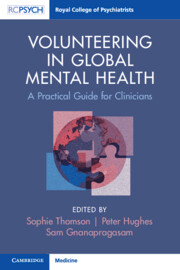Book contents
- Volunteering in Global Mental Health
- Reviews
- Volunteering in Global Mental Health
- Copyright page
- Contents
- Foreword
- Contributors
- Introduction
- Section 1 Key Principles, Theory and Concepts
- Section 2 Practical Guide and Toolkit
- Section 3 Reflective Accounts and Perspectives of Global Mental Health Volunteering
- Chapter 12 Myanmar: Mental Health Training, Recipient Perspective
- Chapter 13 Myanmar: Mental Health Training, Trainer Perspective
- Chapter 14 Somaliland: Mental Health Training, Recipient Perspective
- Chapter 15 Somaliland and Malawi: Mental Health Training, Trainer Perspective
- Chapter 16 Zimbabwe: Diaspora Perspective of Volunteering
- Chapter 17 Sierra Leone: Capacity Building, Trainee Perspective on Volunteering
- Chapter 18 Chad, Darfur, Haiti, Sierra Leone and Bangladesh: Humanitarian Field Experiences
- Chapter 19 Sudan: Mental Health Training, mhGAP Trainer Perspective
- Chapter 20 Kashmir: Mental Health Training, Royal College of Psychiatrists’ VIPSIG Training Programme
- Chapter 21 Ghana: Supervisor Perspective, RCPsych Volunteer Programme
- Section 4 Future of Global Volunteering
- Book part
- Glossary
- Index
- References
Chapter 17 - Sierra Leone: Capacity Building, Trainee Perspective on Volunteering
from Section 3 - Reflective Accounts and Perspectives of Global Mental Health Volunteering
Published online by Cambridge University Press: 08 November 2023
- Volunteering in Global Mental Health
- Reviews
- Volunteering in Global Mental Health
- Copyright page
- Contents
- Foreword
- Contributors
- Introduction
- Section 1 Key Principles, Theory and Concepts
- Section 2 Practical Guide and Toolkit
- Section 3 Reflective Accounts and Perspectives of Global Mental Health Volunteering
- Chapter 12 Myanmar: Mental Health Training, Recipient Perspective
- Chapter 13 Myanmar: Mental Health Training, Trainer Perspective
- Chapter 14 Somaliland: Mental Health Training, Recipient Perspective
- Chapter 15 Somaliland and Malawi: Mental Health Training, Trainer Perspective
- Chapter 16 Zimbabwe: Diaspora Perspective of Volunteering
- Chapter 17 Sierra Leone: Capacity Building, Trainee Perspective on Volunteering
- Chapter 18 Chad, Darfur, Haiti, Sierra Leone and Bangladesh: Humanitarian Field Experiences
- Chapter 19 Sudan: Mental Health Training, mhGAP Trainer Perspective
- Chapter 20 Kashmir: Mental Health Training, Royal College of Psychiatrists’ VIPSIG Training Programme
- Chapter 21 Ghana: Supervisor Perspective, RCPsych Volunteer Programme
- Section 4 Future of Global Volunteering
- Book part
- Glossary
- Index
- References
Summary
Volunteering in international psychiatry during training has many attractions and advantages. Natural breaks in training occur between foundation, core, higher training and consultant posts and Out of Programme Experiences (OOPEs) have been supported, historically. Many trainees have fewer financial, family and caring commitments earlier in their careers, affording them flexibility to spend extended periods abroad. However, earlier stages of training mean less clinical and management experience and OOPEs need to be balanced between the Royal College of Psychiatrists’ regulations about completing examinations and progressing through training. Fortunately, there is a range of opportunities for trainees to get involved, both in-country and remotely, through single one-off placements or repeated visits for shorter durations. In this chapter, we describe one personal experience of long-term volunteering, highlighting learning points and key considerations, as well as indicating alternative opportunities to consider.
- Type
- Chapter
- Information
- Volunteering in Global Mental HealthA Practical Guide for Clinicians, pp. 153 - 164Publisher: Cambridge University PressPrint publication year: 2023



